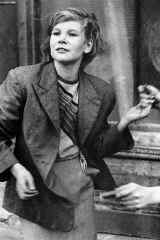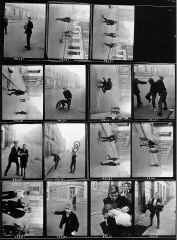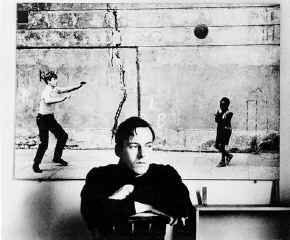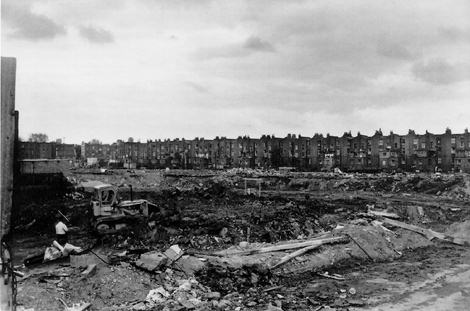Roger Mayne's most famous series of photographs were taken in one
street, Southam Street, for five years from 1956-1961.
The Southam Street series essentially captures the urban life of one of the poorest areas
of the late-1950's era London, — the main subjects were the children who played in
the streets, with the run-down buildings as the background.
Morrissey has featured several of Mayne's Southam Street photos on recent record sleeves
and during the 1997 tour as backdrops.
Roger Mayne photos featured on sleeves (click to enlarge):
 |
 |
| "Interlude" |
"Roy's Keen" (Row 3, Col. 2) |
Roger Mayne photos featured as tour backdrops (click to enlarge):
Roger Mayne on the period:
"My reason for photographing the poor streets is that I love them, and the life on
them (I am here concerned with what I see: for the moment it is irrelevant that most of
these houses have no baths, and that their structure is endangered by disrepair). Empty,
the streets have their own kind of beauty, a kind of decaying splendour, and always great
atmosphere — whether romantic, on a hazy winter day, or listless when the summer is
hot; sometimes it is forbidding; or it may be warm and friendly on a sunny spring weekend
when the street is swarming with children playing, and adults walking through or standing
gossiping. I remember my excitement when I turned a corner into Southam Street, a street I
have returned to again and again... I think an artist must work intuitively, and let his
attitudes be reflected by the kinds of things he likes or finds pictorial. Attitudes will
be reflected because an artist is a kind of person who is deeply interested in people, and
the forces that work in our society. This implies a humanist art, but not necessarily an
interest in 'politics'."
 |
| Portrait of Roger Mayne by John Deakin, 1957 |
Remembrance of a Southam Street past
quotes/extracts from letters of Southam Street residents
"My older sister and I were both born in the street. She in 1945 and me in
1950, my younger sister was born in 1952 in hospital but we were still living in Southam
St. We lived there with my parents until we were rehoused in 1961-62. Both sets of
grandparents lived there along with a couple of aunts and uncles.
We were a very happy band living in Southam St. where everybody knew everyone else. They
were hard times and my mum tells me poor times but I have very happy memories. The
children were always 'playing out' in the street and were perfectly safe. We were one of
the first families to own a television and everybody used to crowd into our living room
every evening to watch.
Life has obviously improved as my parents, sisters and myself are all house owners, but
both my mum and dad miss the closeness of the street. You could leave your front door open
and everything and everyone would be perfectly safe, and if you felt a bit depressed you
only needed to stand on the doorstep and somebody would stop to talk and cheer you
up."
Mrs. Jennifer Reilly (nee Shepherd)
"I can remember reading many years ago in the Kensington Post - the writer referring
to this particular street, maintained that some 95% of the male inhabitants had at least
one criminal conviction. Somewhat of an understatement we always felt! I can very well
remember my uncle who lived there in the twenties telling me that the police on Saturday
night patrolled four abreast. Be that as it may, there was nevertheless a strong community
spirit, and people would always help each other. As far as I can recall the street and
much of the surrounding area was owned by a housing trust and two ladies used to collect
the rent without fear of molestation, which perhaps tells us something of the nature of
those times and the different attitudes then prevailing."
Mr. M. J. Cleary
"'Fun' was made up of not so much toys because we all didn't have many,
but by swinging around the lamp post on a long skipping rope, the very one in the book
pictured on the corner of the Craven House, as it was then called... and having a ride in
someone else's go-kart that their father made, and playing Queen Anne in the evening. Then
to wait for the call of your Mum that it was time for bed. All the windows would open
gradually as you were called in... I am very pleased to have been one of the Southam
Street children that played on the sunny dirty street."
Mrs. Mary Gething (nee Roche)
 |
| Demolition of Southam Street, 1969 |
information and images taken from "The Street Photographs Of Roger Mayne",
Zelda Cheatle Press 1993.
last modified: 10 Jun 1998 |